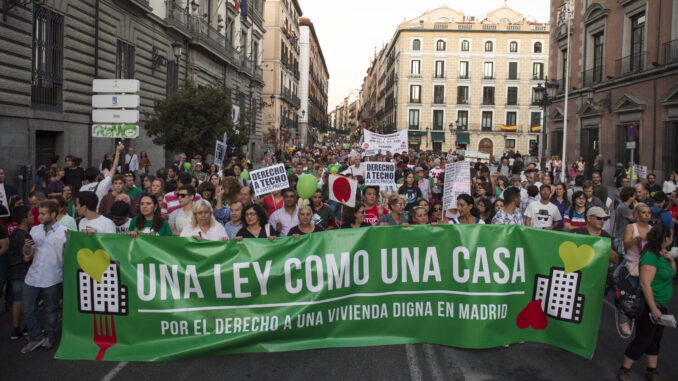
MADRID — Living in Spain just got pricier. And two of the country’s five main political parties are proposing a housing law to address the issue.
A rented house is 50 percent more expensive today than five years ago. Though most Spaniards earn a salary of around 1,000 euros ($1,177) per month, finding an apartment for less than 500 euros ($589) in cities like Madrid or Barcelona is practically impossible.
That’s why one of the coalition government agreements between the PSOE (Spanish Socialists Workers’ Party) and Podemos (a far-left party) was to approve a new housing law that would regulate the price of rents. (The current prime minister is Pedro Sánchez of the PSOE. He has held the post since June 2018.)
It’s similar to laws in the Netherlands, Germany, France and some U.S. states. But the law, originally expected to be approved last January, has caused a confrontation between the two political Spanish parties. And it’s not the first time they have clashed over the issue of housing.
In 2019, the regulation of rents also paralyzed the new Spanish Housing Law, which finally changed only the duration of the contract to five years. They were reduced to three years in 2013 by the Government of Mariano Rajoy.

Now, the two parties again disagree on how to approach rent regulations and the conflict coincides with the departure of Pablo Iglesias, leader of the Unidas Podemos, who is exiting his role as deputy prime minister to run for the president of the Madrid region.
The point of contention: PSOE wants to reward owners with tax benefits if they lower the rental price of homes by 10 percent Podemos wants prices to be set in the areas where housing has become more expensive in recent years.
“The PSOE has proposed a kind of public subsidy for those private owners who voluntarily lower rental prices,” says Alejandra Jacinto, an expert housing lawyer who will run in the elections of the Community of Madrid on May 4 as an independent candidate with Podemos. “It is a measure that does not meet the main objective of lowering rental prices. Even the Treasury technicians say it is ineffective because it does not provide any incentive to owners, since it continues to be more profitable to keep prices high.”
Jacinto explains the rental price regulation model proposed by Podemos is similar to the one approved in Catalonia in 2019. It consists of limiting prices by areas, based on the prices of the latest contracts. But he also said the main unions in Spain — CC.OO. and UGT — have proposed another model which consists of limiting rental prices by zones, according to the average salary.
“It is about determining residential areas and zones and, if the average salary is 1,000 euros, that the rent cannot exceed 30 percent of that amount,” explains Jacinto.
“The regulation of rent is a great measure and a way to reduce the emergency,” says Juanjo Ramón, spokesman for the Platform for People Affected by Mortgage, one of the civil groups that has had the most influence in Spain since the housing crunch caused by the economic crisis of 2012.
However, according to Ramón, the housing law should also include a series of measures that are not being discussed, but his group detailed in a bill sent to the Congress in 2018. Those measures focused on four points: affordable rents, the suspension of evictions, more government-owned, subsidized housing, and a guarantee of basic supplies.
“PSOE and Podemos promised that, if they govern, they would listen to us and promote a housing law that includes what we ask for,” explains Ramón. Basic measures for the new housing law: large homeowners are obliged to allocate part of their properties to subsidized housing, as has already been approved in 2019 in Catalonia.
On this point, Podemos has proposed that large owners be forced to allocate 30 percent of their homes to subsidized rental units. He has also referred to the homes of the Sareb, an entity created by the Government and the main Spanish banks in 2012, to buy the homes the banks had then, which accumulated a debt of 35 billion euros (roughly $41 billion U.S.) that Eurostat has now included as public debt.

“We are the European country with the most empty houses and even now, there is talk of public-private partnerships to build more houses. What we need is to use the Sareb flats,” says Ramón.
The Association of Rental Home Owners said forcing the owners to allocate a part of their habitual residence to social rent is “an expropriation” and “goes against the confidence that national and international investors ask for.”
The association groups together large real-estate companies — such as Testa Homes-Blackstone, AXA Investment Managers or Aedas Homes — that add 43,390 homes for rent. Since April 2020, Joan Clos, former mayor of Barcelona and former minister of industry between 2006 and 2008 with the PSOE, has been its president.
Podemos sees the negotiations stalled with the rental regulation as the main sticking point. The results of the elections to the government of Madrid on May 4 could impact this by turning the balance toward one of the parties.
(Edited by Fern Siegel and Matthew B. Hall)
The post Housing Crisis: Political Parties Clash Over Rent Laws In Spain appeared first on Zenger News.
